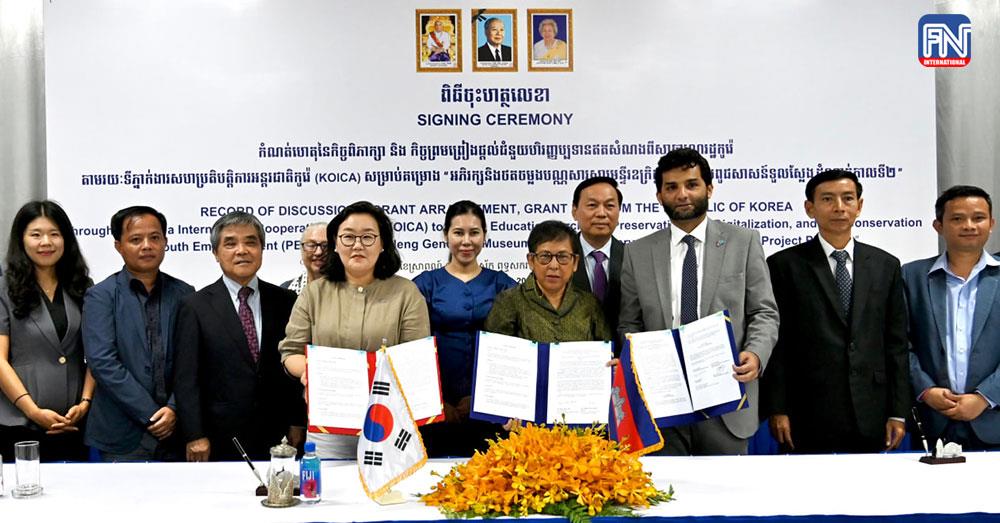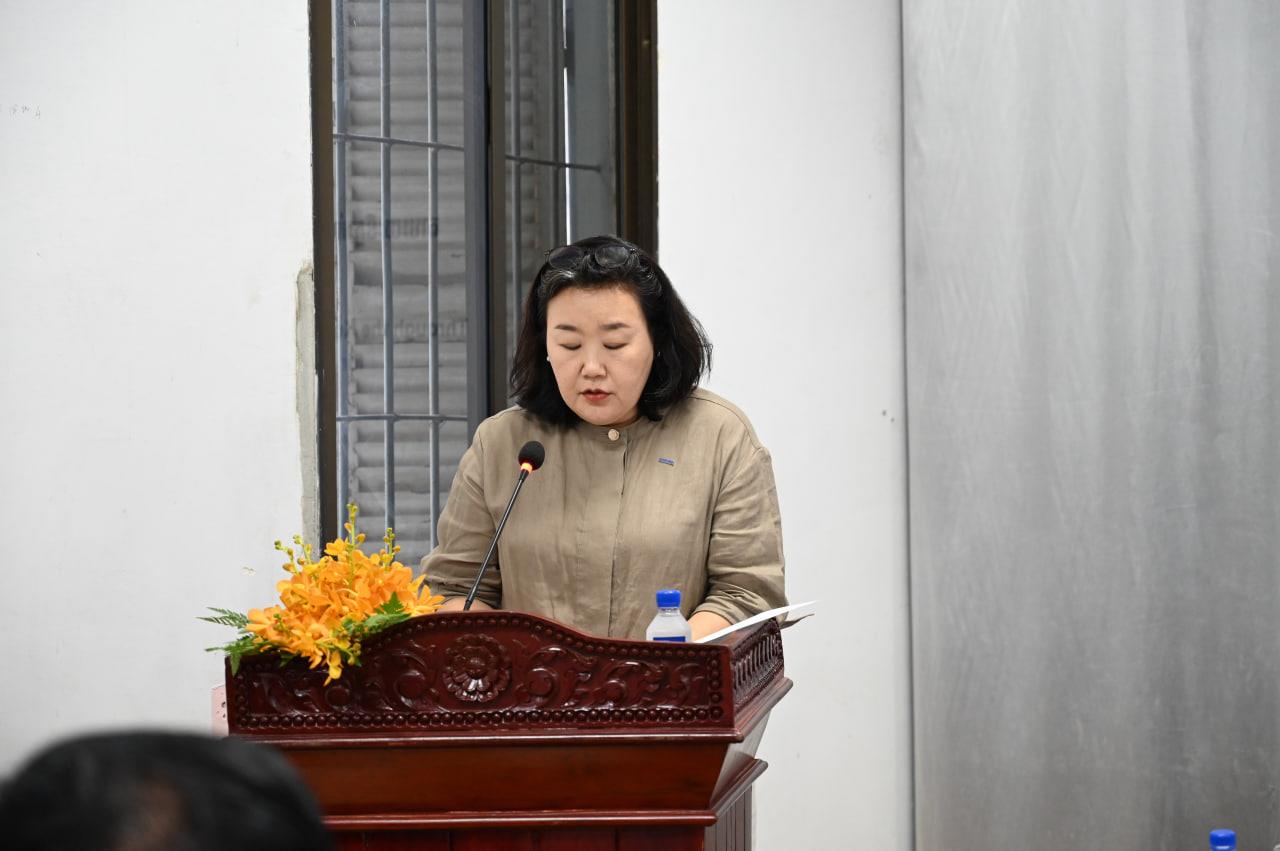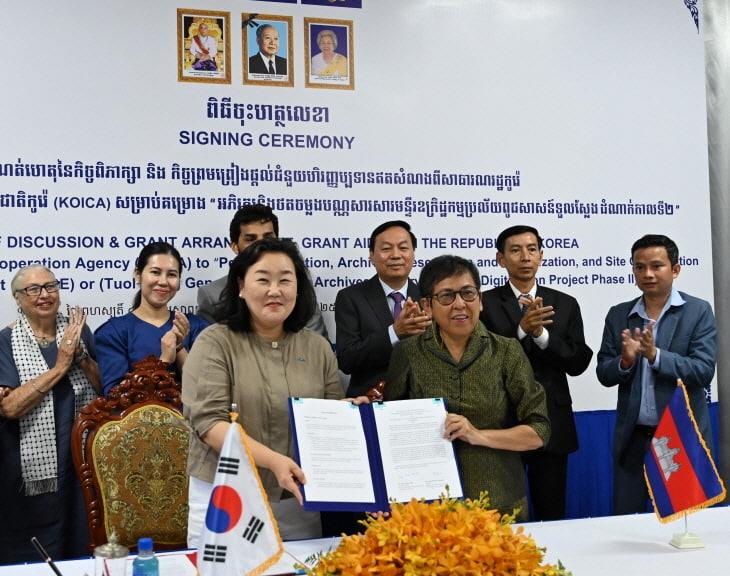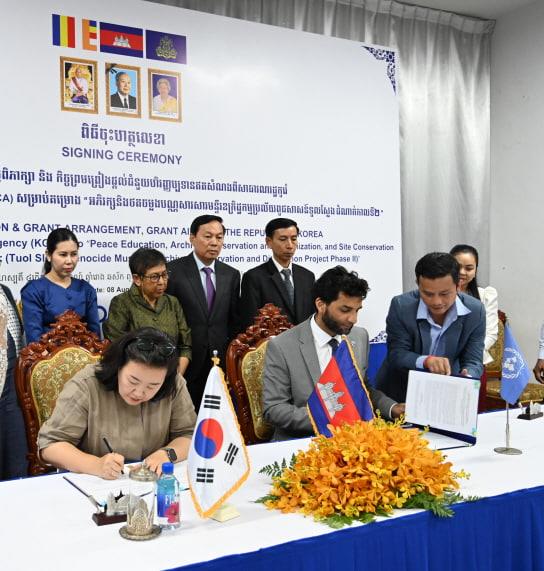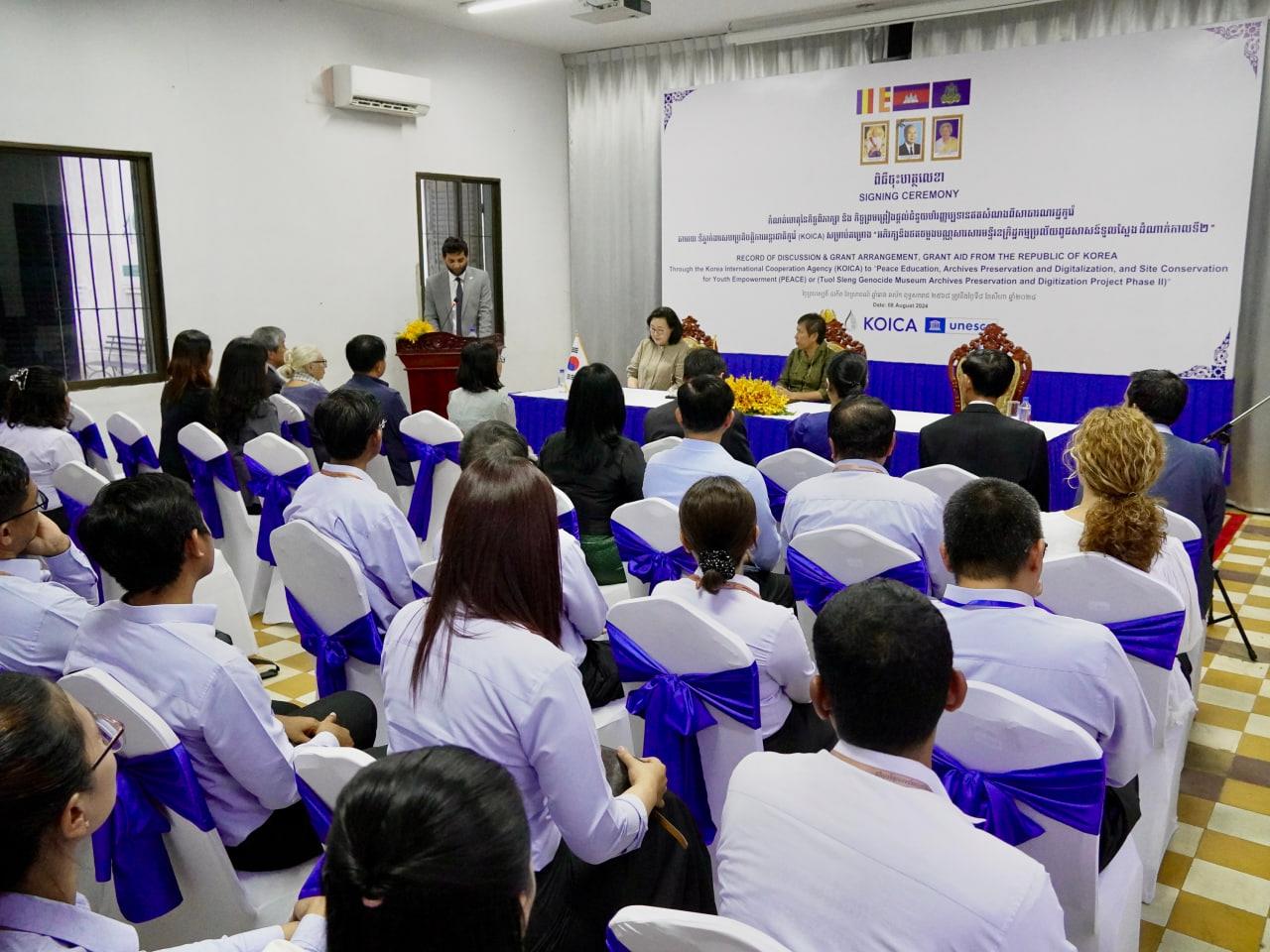Phnom Penh (FN), Aug. 8 — Preserving historical records is one of the most important foundations for educational growth and cultural preservation. The Royal Government of Cambodia (RGC) has long emphasized the importance of Cultural Heritage Preservation, and it remains a crucial focus in the nation’s development agenda. Among the various initiatives, the preservation and digitization of the Tuol Sleng Genocide Museum archives are critical, especially considering the importance of historical education and remembrance. However, challenges remain in ensuring the quality and accessibility of these archives. The question remains: how to enhance preservation and accessibility?
To address these challenges, the Korea International Cooperation Agency (KOICA), in collaboration with the United Nations Educational, Scientific and Cultural Organization (UNESCO) and the Ministry of Culture and Fine Arts, has launched “Peace Education, Archives Preservation and Digitalization, and Site Conservation for Youth Empowerment (PEACE) or (Tuol Sleng Genocide Museum Archives Preservation and Digitization Project Phase II)”.
The project objectives are to contribute to the following purposes: 1)-the dissemination of values of Cambodian Memorial Sites (CMS) through record conservation and the advancement of archive digitization; 2)-the enhancement of conservation conditions and visitor environments for the conservation and dissemination of CMS values; 3)-the dissemination of understanding of CMS through the improvement of exhibitions; and 4)-the improvement of understanding of peace through peace education.
In a recent high-level dialogue between Samdech Moha Borvor Thipadei HUN Manet, Prime Minister of the Kingdom of Cambodia, and His Excellency Yoon Suk Yeol, President of the Republic of Korea, both nations issued a Joint Statement on the Establishment of a Strategic Partnership on 16 May 2024. Paragraph 20 of the statement underscored Cambodia’s gratitude to South Korea for its proactive support in conserving and restoring cultural heritage sites such as the Chorm Temple in the Preah Pithu Temple Group and the Terrace of the Elephants in Angkor Thom. Recognizing the significance of capacity building in cultural development, both sides affirmed their dedication to ongoing cooperation in cultural education and development initiatives, including the establishment of an arts education platform in Cambodia and the PEACE Education project.
The project’s objective to promote a peaceful society through culture, heritage, education, and youth empowerment supports Cambodia’s Pentagonal Strategy – Phase I (2024-2028) for Growth, Employment, Equity, Efficiency, and Sustainability: Building the Foundation Towards Realizing the Cambodia Vision 2050. It specifically contributes to Principle 5, fostering harmony, resilience, and inclusivity while balancing development and environmental conservation. The project aligns with Pentagon 4 by ensuring the sustainable management of natural resources, cultural heritage, and tourism, and strengthening urban management and modernization. It supports Pentagon 1 by enhancing the quality of education, sports, science, and technology, and fostering a highly civilized society characterized by morality, equity, and inclusiveness.
Additionally, it advances Pentagon 5 through the development of digital infrastructures and establishing a reliable and secure digital environment.
KOICA and UNESCO have formally signed a "Grant Arrangement" and the “Record of Discussion” with the Ministry of Culture and Fine Arts of Cambodia to launch the second phase of the "Peace Education Archives Preservation and Digitization and Site Conservation for Youth Empowerment (PEACE)" project, also known as the Tuol Sleng Genocide Museum Archives Preservation and Digitization Project Phase II on 8 August 2024, at Tuol Sleng Genocide Museum.
The Grant Arrangement was signed by Choi Moon Jung, Country Director of KOICA Cambodia Office, and Alam Sardar Umar, UNESCO Representative to Cambodia, while the Record of Discussions (RoD) was signed by Choi Moon Jung and Phoeurng Sackona, Minister of Culture and Fine Arts.
Choi Moon Jung, Country Director of KOICA Cambodia Office, expressed the profound importance of this project. "KOICA's aid project in Cambodia symbolizes the shared sorrow and burden between the Cambodian and Korean people," she said. "We aim to alleviate Cambodia's grief and pain through this project, and it serves as a foundation to educate future generations about Cambodia's tragic past to protect the country from similar tragedies in the future."
The first phase of the Tuol Sleng Genocide Museum Archives Preservation and Digitization Project saw significant achievements, including the digitization of over 745,494 pages and nearly half a million archives. These records are now accessible through a bilingual website. The project also provided essential technical assistance to the museum staff, contributing to the museum's recognition with the UNESCO/Jikji Memory of the World Prize in 2020.
Building on the success of the first phase, KOICA has committed an additional US$3 million over five years, starting in 2024. This phase extends the project by one year and provides an additional USD 1 million in funding compared to the original proposal. The project aims to promote a peaceful society through culture and heritage education and youth empowerment, aligning with Cambodia's national strategy, the Pentagonal Strategy – Phase I.
In recognition of the project’s success and the expertise of Hang Nisay, Director of Tuol Sleng Genocide Museum, both Rwanda and Timor-Leste have sought his insights, inviting him to join their respective committees. These countries, which have experienced their own tragic histories, value the lessons learned from Cambodia’s digitization and preservation initiatives. By collaborating with Rwanda and Timor-Leste, Hang Nisay contributes to a broader international effort to preserve and learn from the past, fostering a global dialogue on memory, justice, and reconciliation.
The tourism sector, a crucial pillar of Cambodia’s economy, has already demonstrated its potential by generating billions of dollars in revenue and creating numerous jobs. In 2019 alone, the sector directly employed 630,000 people, with tourism receipts reaching USD4.9 billion, which constituted 18.2 percent of Cambodia's GDP—the highest among ASEAN+3 economies. Moving forward, the project aims to attract more tourists, further boosting tourism revenue, creating jobs in conservation, digitization, and education, and enhancing skills development, particularly in archival management and peace education. These efforts will not only increase employability but also ensure sustainable economic growth for Cambodia.
By ensuring the preservation and accessibility of historical archives, the project facilitate academic research and foster a deep awareness of the past, encouraging a collective responsibility to prevent future atrocities. Additionally, protecting and preserving our cultural heritage sites and promoting intergenerational dialogue not only helps to safeguard our rich cultural legacy but also preserves the oral histories and practices that define our identity. These efforts are vital for fostering a sense of continuity and connection among all generations of Cambodians.
On behalf of the government of the Republic of Korea, KOICA has committedly delivered the responsibilities to strengthen the partnership between the two countries and to bridge the people more closely, and will continue to do so.
The Korea International Cooperation Agency (KOICA) is a bilateral grant aid agency of the government of the Republic of Korea. Since its opening of the Phnom Penh Office in 2003, the KOICA Cambodia Office has implemented various development cooperation programs in education, health, and rural development sectors.
=FRESH NEWS
